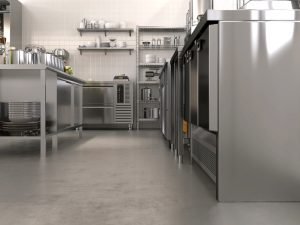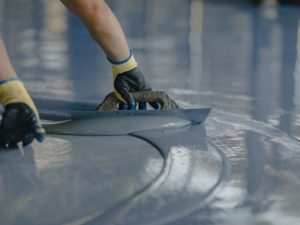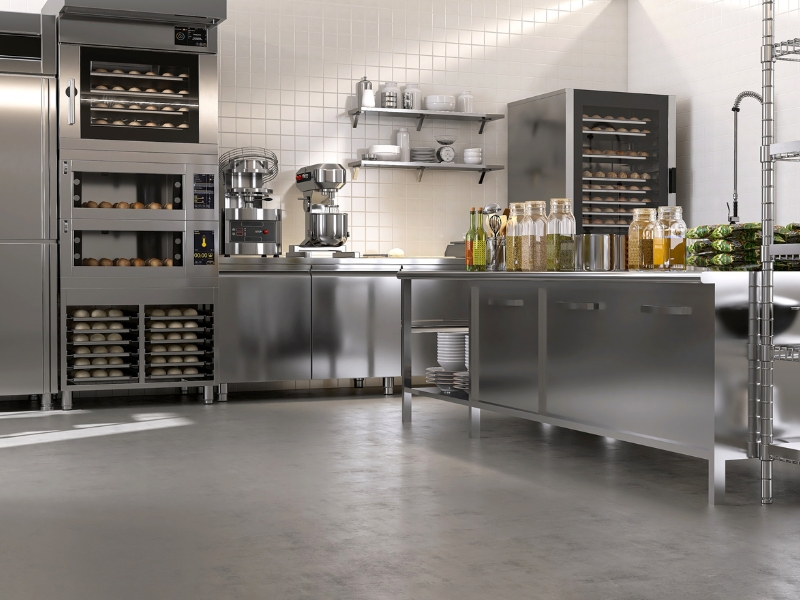Finding a suitable flooring material for a commercial kitchen is essential to keep up with heavy foot traffic, spills, and the frequent movement of equipment. Scratch-resistant flooring is necessary for commercial kitchens, as it helps maintain a clean, professional look while enduring the demands of a fast-paced environment. But which flooring options truly offer the durability you need? Let’s explore the top scratch-resistant commercial kitchen flooring materials and why they’re ideal for any bustling kitchen space.
What are the top scratch-resistant commercial kitchen flooring materials?
Several materials are known for their scratch-resistant properties in commercial kitchens. Epoxy flooring is durable and long-lasting, with a surface that can withstand heavy use, making it ideal for high-traffic areas. Vinyl flooring is affordable and offers reasonable scratch resistance, though it may need replacing more often in high-wear zones. Quarry tile is highly durable, scratch-resistant, and slip-resistant, making it suitable for kitchens with moisture and movement. Polished concrete offers good scratch resistance and low-maintenance care, though it’s not explicitly designed for kitchens. Rubber flooring, while less common, provides impact resistance and good scratch resistance but lacks the aesthetic appeal of other options.
Why Is scratch resistance significant in commercial kitchen flooring materials?
Scratch-resistant flooring helps commercial kitchens in multiple ways:
- Maintains aesthetics: Scratches can make a floor look worn out and unprofessional. Scratch-resistant floors keep a kitchen looking clean and presentable, even with frequent use.
- Reduces maintenance costs: Floors that resist scratches require less repair and refinishing, saving both time and money.
- Improves hygiene: Scratches and gouges can trap dirt, bacteria, and food particles, which are harder to clean. Scratch-resistant materials help maintain sanitary conditions.
- Enhances safety: Damaged floors can be hazardous for kitchen staff, who might slip or trip over scratches or damaged spots. Scratch-resistant materials contribute to a safer workspace and improve workplace safety.
How does epoxy flooring perform as a scratch-resistant option for commercial kitchens?
Epoxy flooring stands out in commercial settings due to its durability and scratch-resistant surface. Here’s why it performs so well:
- Highly durable coating: Epoxy resists everyday wear and impacts from heavy objects.
- Chemical resistance: Withstands cleaning agents, oils, and food substances without damage.
- Seamless finish: No grout or joints, reducing areas prone to scratches.
- Customisable thickness: This can be layered for added durability when handling heavy equipment.

Which commercial kitchen flooring materials offer the most extended durability?
When it comes to longevity, not all scratch-resistant floors are created equal. Here’s how popular options compare:
- Epoxy flooring: Lasts 10–20 years with proper care.
- Polished concrete: Can last decades but may need resealing.
- Quarry tile: Durable, lasting up to 15+ years with maintenance.
- Vinyl flooring: Lasts 5–10 years, depending on usage.
- Rubber flooring: This lasts up to 15 years, with occasional surface treatments.
How do scratch-resistant commercial kitchen flooring materials contribute to safety?
Safety is crucial in commercial kitchens, and scratch-resistant materials help reduce risks:
- Slip-resistant finishes: Epoxy with slip-resistant additives lowers fall risks.
- Minimises trip hazards: Scratch-resistant floors prevent damage that could cause uneven surfaces.
- Easier to clean: Scratch-resistant surfaces simplify cleaning and maintain hygiene.
- Better visibility: A smooth, well-maintained floor improves visibility, reducing accidents.
Is epoxy flooring the best choice for scratch-resistant and easy maintenance needs?
Epoxy flooring for kitchens is widely regarded as one of the best solutions for commercial kitchens. Here’s why it’s a top choice for scratch-resistant and low-maintenance needs:
- Non-porous surface: Epoxy doesn’t absorb spills, making cleaning fast and easy.
- Stain resistance: Epoxy resists staining from food and chemicals, keeping a kitchen looking professional.
- Simple cleaning requirements: Epoxy floors require only basic cleaning with soap and water, helping kitchens save on maintenance time.
- Customisable for slip resistance: Additives can make epoxy floors more slip-resistant, improving safety while maintaining ease of maintenance.

What are the benefits of choosing scratch-resistant flooring for commercial kitchens?
Opting for scratch-resistant flooring offers many advantages for commercial kitchens:
- Longevity: Scratch-resistant materials often have a longer lifespan, which reduces the need for frequent replacements.
- Lower repair costs: Scratch-resistant floors resist the types of damage that often lead to expensive repairs.
- Professional appearance: Kitchens look more polished and hygienic with floors that resist scratches and wear.
- Enhanced productivity: Scratch-resistant, easy-to-clean floors enable kitchen staff to work efficiently without frequent interruptions for cleaning.
How do different commercial kitchen flooring materials handle heavy foot traffic?
Commercial kitchens experience significant foot traffic, making scratch resistance even more critical. Here’s how top materials fare:
- Epoxy flooring: Commercial epoxy flooring ensures it can withstand heavy traffic, making it perfect for busy kitchens.
- Polished concrete: Durable for high traffic but needs regular maintenance to maintain shine.
- Quarry tile: Handles heavy traffic but may chip with frequent drops.
- Vinyl flooring: Withstands moderate traffic but shows wear faster.
- Rubber flooring: Absorbs impact well and is suitable for moderate foot traffic.
Why should sydney businesses consider scratch-resistant epoxy flooring for their kitchens?
For commercial kitchens in Sydney, epoxy flooring offers many benefits tailored to the demands of a professional kitchen:
- Durability in high-humidity environments: Epoxy flooring withstands Sydney’s humid climate without warping or deteriorating.
- Customisable aesthetics: Epoxy flooring can be customised to match any kitchen’s style, from sleek and modern to functional.
- Enhanced workplace safety: Slip-resistant options help keep workers safe from falls and spills.
- Cost-effective solution: Epoxy offers long-lasting performance and minimal maintenance, providing excellent value.
- Supports sustainability: Many epoxy solutions are environmentally friendly, reducing waste from frequent replacements.
Choosing scratch-resistant flooring for your commercial kitchen
When it comes to selecting flooring for your commercial kitchen, scratch resistance is a critical factor in ensuring durability, safety, and hygiene. Epoxy flooring is often considered the best flooring for commercial kitchens due to its exceptional resilience, easy maintenance, and long lifespan., making it ideal for high-traffic kitchen environments. Vinyl, quarry tile, polished concrete, and rubber flooring offer varying scratch resistance, each with unique benefits. The best choice depends on your kitchen’s needs, including traffic volume and aesthetic preferences.
Sydney Wide Epoxy Flooring is your trusted partner for epoxy flooring in commercial kitchens across Sydney. Our experienced team is dedicated to delivering top-quality results tailored to your specific needs. We use premium materials and the latest techniques to ensure your kitchen floor is both functional and visually appealing. With a strong focus on customer satisfaction, you can rely on us for a flooring solution that will stand the test of time. Choose Sydney Wide Epoxy Flooring for your epoxy flooring needs and experience the difference that professional expertise and superior craftsmanship make.

